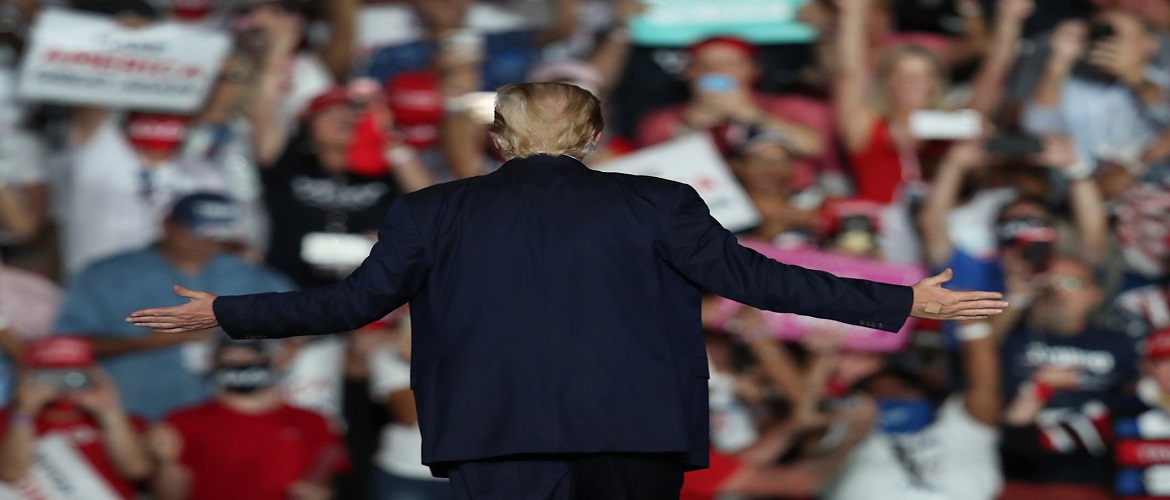A Favourable Anomaly Called Donald Trump
October 20, 2020 | Expert Insights

Donald Trump’s White House address for the Republican National Convention hosted around 1,500 supporters. Despite health officials’ warnings, the supporters were neither encouraged to wear masks nor practice social distancing. They applauded their president as he lambasted the Democratic Party and made promises for the next four years. Mr. Trump also discussed his plans to save the American economy and combat the “China virus” through vaccination, as the crowd continued chanting “Four More Years”.
But what stood out was the positive atmosphere throughout the rally. Trump supporters cheered each time he criticised his opponents. The audience seemed to enjoy his rhetoric, perhaps even more than the substance of his speech. This affirms studies that reveal Mr. Trump’s intrinsic ability to captivate his audience, compared to prior election candidates such as Hillary Clinton. With this kind of support, the result of the 2020 election remains unpredictable. Although Mr. Trump has lost supporters – especially among the Black community – over the past few months, it is necessary to analyse the reason why so many people still risk their lives (literally) to demonstrate their loyalty to him.
POLICY VS PERSONALITY
Trump supporters seem to fall into two categories. The first includes voters who are fairly informed and rationally assess his policies. Republicans against illegal immigration, higher corporate taxes, and military intervention in Iraq, for instance, may find their views compatible with the current administration. Such voters could also constitute Americans who voted for Barack Obama in the 2008 election and were disappointed with the aftermath. These supporters may also disagree with some of Mr. Trump’s policies, or criticise his controversial public statements, but ultimately stand their ground due to lack of more compatible options.
The second type, however, are more fervent supporters unconcerned by the president's specific policies but value his persona. These voters tend to be responsive to his rhetoric and admire his emphasis on economic nationalism. It is likely that they are heavily conditioned by the modern consumerist culture that stresses on self-interest and self-promotion. This explains why many are captivated by Mr. Trump’s theatrics that convert even his routine COVID-19 press briefings into political rallies. As the former reality show Apprentice star draws in the audience with his oft-hyperbolic language, self-praise, and outrageous tweets, voters unexposed to or uninterested in the informed political analysis are prone to digesting his remarks – regardless of how factually incorrect or problematic they may be. To such voters, Mr. Trump could even expand to a symbol as he dismisses traditional neoliberal policies that the Democrats have espoused since World War II.
LUKEWARM OPPOSITION
Former Democrats that became Trump supporters are likely to have chosen him due to his boldness. The 2016 election suggested that Ms. Clinton’s approach was relatively lukewarm, as she conducted fewer rallies and reportedly made less effort to appeal to Mr. Trump’s primary demographic i.e. the white middle class. She also could not fully appeal to black and other minority voters due to her husband Bill Clinton’s policies that led to mass incarceration, as well as the Obama administration’s inability to end police brutality. By portraying Mr. Trump as a dangerous anomaly, the Democrats played into his supporter’s motivation to disrupt the pre-existing system. Thus, the more lukewarm the Democrats appeared, the more appealing Mr. Trump became. To the reality television enthusiast, Mr. Trump is a rebel. In fact, his blunt leadership style is an anomaly in America’s recent history.
AN ANOMALY
According to a Pew Research Center survey, almost 90 per cent of Trump supporters are confident that he will get re-elected. In contrast, fewer (82 per cent) Joe Biden supporters in the survey believe in his victory. Overall, Trump voters seem to demonstrate more enthusiasm for his re-election. This level of confidence could be tied to the voters’ admiration of Trump’s distinct boldness – both in terms of his personality and policies.
His utterances on the COVID 19 spread and the BLM movement may not have gone well with the people in general and could have pushed him behind Mr. Biden on popularity polls. But his plan to reopen the economy has restored millions of jobs, especially throughout May and June, and his firm policies on China have gained him far-reaching praise. To his supporters, he is a patriot who puts 'America First' and protects the nation's Confederate monuments. Thus, his differing actions from his modern predecessors and contemporaries are an anomalous trait that Trump supporters continue to find desirable.
Whether the president's boldness is merely a performance tactic to emotionally appeal to his supporters, or it accurately reflects his policies, this trait has certainly made a strong impression on the electorate. He has effectively discerned the general anti-liberal backlash and capitalised on it, much like a reality television star would. Thus, despite his administrative blunders, his appeal continues with his die-hard supporters who are becoming even more vocal in the light of Democrats’ backlash against the president.
CONCLUSION
Trump is a symbol of a favourable anomaly for those fed up with the current system. As Democrats continue highlighting him as a dangerous aberration, Trump supporters would likely continue feeding off of that energy. He may either remain an anomaly in the US political system or set the stage for more candidates challenging the liberal world order. While one can advise supporters enamoured by Mr. Trump’s rhetoric to expand their perspectives to make informed choices in the election, the fact remains that his personality does generate strong emotions on either side of the political divide.








Comments